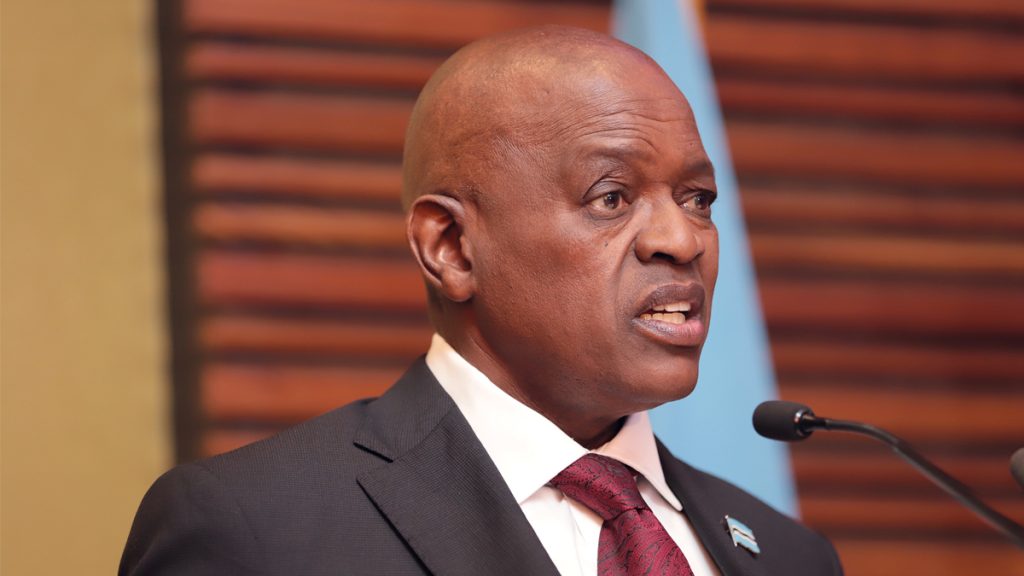BAKWADI LEKOPANE
Botswana Council of Churches (BCC) have dragged President Mokgweetsi Masisi into their dispute with government over the amendments to the Societies Act to introduce stringent regulatory measures.
Early this week, BCC leadership approached Masisi and asked him to intervene by addressing their grievances by replacing the existing Societies Act under which religious groups are currently registered, with a new law, the Religious Organisations Act, exclusively for churches. The BCC, representing various Christian churches and religious organizations in Botswana, argued that the current registration process does not adequately serve their interests and unique needs.
In a meeting with Masisi, BCC leadership expressed concerns about the Department of Civil and National Registration, which currently manages the registration of churches and other religious organizations under the Societies Act. They emphasized that religious organizations should be governed by a distinct legal framework that specifically addresses their concerns. They proposed that a new law, Religious Organisations Act, should be entrenched in the constitution, which will adequately deal with issues that affect religious bodies. They further voiced concerns about recent amendments to the Societies Act, saying they are a significant threat to Christianity.
The controversial amendments to the Societies Act require religious bodies, among other nonprofit organizations, to register with the Financial Intelligence Agency (FIA). These amendments mandate that churches and religious groups report deposits of P10,000 and above, implement Know Your Customer (KYC) procedures on all their members, and require formal qualifications in theology for pastors, among other provisions.
The Ministry of Labour and Home Affairs recently introduced a re-registration exercise for all existing societies, including faith-based organizations, under FIA. The ministry clarified that this exercise is intended for automation purposes and not to disadvantage existing societies. They have rejected faith based organizations protests that there was no consultation stating that the amendments to the Societies Act of 2022 were made in consultation with various stakeholders, including faith-based umbrella organizations. The amendments aim to enhance compliance with Botswana’s anti-money laundering regulations and protect societies from potential abuse.
The amended Societies Act stipulates that all societies must register with the Registrar of Societies for monitoring and supervision. The registration process is designed to minimize the risk of financial offenses. The Registrar may refuse to register a society or its office bearers if they are subject to sanctions or embargoes issued by the United Nations Security Council. The amended act also introduces qualification criteria for office bearers within societies to ensure they are fit and proper individuals, thus reducing the risk of financial offenses within these organizations. Additionally, it outlines increased penalties for violations to promote effective, proportionate, and dissuasive sanctions.
In an interview, the Permanent Secretary to the President, Emma Peloetletse said the president has noted BCC’s submissions and suggestions for a Religious bodies Act. “The concerns pertaining to the new Act were noted and we will continue to dialogue with faith-based organizations for solutions and the betterment of this country,” she said.
Peloetletse said BCC also advised that the dispensation of chaplains at Botswana Defence Force (BDF) and Polices Services be decentralized across Ministries to allow Ministries and state departments to have pastors in-house so that they could use them as and when the need arises.
It is not yet known whether the churches bid for a religious bodies Act will succeed or not but theological experts say calls for such a body are old and very unlikely to materialize. Some within government are said to be of the view that the requirements and regulations outlined in a Religious Bodies Act may conflict with the deeply held beliefs and practices of certain religious groups. This, they posit, could lead to legal challenges and tensions between the government and religious institutions.
Furthermore some are reportedly of the view that such legislation may be perceived as government interference in religious matters as it could potentially infringe on the freedom of religious organizations to practice their faith without government oversight.
